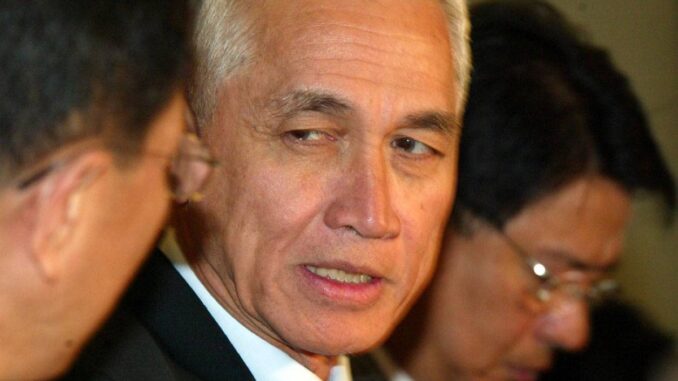
FORMER Finance Secretary Margarito “Gary” Teves called on the government to scale back on unprogrammed appropriations and put more focus on essential social and infrastructure projects already in programmed funds.
Teves, who served as finance chief during the Arroyo administration, urged sitting government regulators to reduce unplanned spending and prioritize key programs already in the pipeline.
This way, he said, there would be no need to scrutinize government-owned-and controlled corporations (GOCCs) for excess financial resources that could be tapped to fund unprogrammed appropriations.
FORMER Finance Secretary Margarito “Gary” Teves. FILE PHOTO BY RENE DILAN
Teves pointed out that in 2023 and 2024, the “unprogrammed appropriations reached P807.2 billion and P731.4 billion, or 15 percent and 13 percent, respectively, of the national government budget” — more than double the 5-percent average from 2010 to 2022.
While he acknowledged that “a reasonable amount of unprogrammed appropriations is necessary to cover expenses arising from unforeseen events since the national government budget is prepared one year ahead of time,” he warned that “moving crucial social and infrastructure projects from programmed to unprogrammed is not only questionable but also undermines the government’s commitment to inclusive development and fiscal prudence.”
Teves, named “Best Finance Minister” in Asia in 2009, expressed concern that including key priority items under unprogrammed appropriations — such as the upgrading of health facilities, the training of health professionals, payment of government personnel benefits, and construction of housing for the poor — could result in “delayed implementation of vital programs since there is no definite funding source.”
To address this, he called on President Ferdinand Marcos Jr. to convene the Legislative-Executive Development Advisory Council (Ledac) “as a platform to allow the executive and legislative branches to agree on the priority programs that should strictly remain programmed and budget items that will be placed under unprogrammed.”
“This could be done for the proposed 2025 national government budget before the deliberation in the bicameral conference committee. The Ledac can be convened for succeeding years before the budget is formally sent to Congress,” the former DoF chief said.
He likewise suggested that the bicameral conference committee be open to the public via livestreaming and the publication of minutes to enhance transparency and accountability in the budget deliberation process, particularly in monitoring congressional insertions or amendments in the budget.
The joint congressional oversight committee on public expenditures, in coordination with the Department of Budget and Management, “should be more proactive in monitoring the use of public funds by government agencies and GOCCs,” he said.
He added, “With billions of pesos of idle funds from GOCCs currently being remitted to the national treasury, the public has the right to know whether these funds are being spent judiciously.”
Moreover, the Development Budget Coordination Committee “should regularly monitor spending behavior across government, particularly those that are historically weak in utilizing its budget, to prevent the existence of idle funds. Allotted public funds must always be spent to translate into tangible programs and projects that improve the welfare of Filipinos.”
“Given all this, it is necessary to unburden the finance secretary from scrutinizing financial statements of each GOCC in search of idle funds just to finance the rising unprogrammed appropriations. It would be more efficient and practical for the finance secretary to focus on his primary role of increasing collection efficiency from existing taxes, recommending necessary new tax measures, and ensuring that we are within prudent international standards in managing our fiscal deficit and debt,” Teves said.
Teves was one of several former finance secretaries who recently backed the use of idle GOCC funds.
He and several others threw their support behind the Department of Finance’s exercise of its authority to utilize the excess funds of GOCCs to finance crucial government projects in areas like health, education, social services, and infrastructure.





Be the first to comment